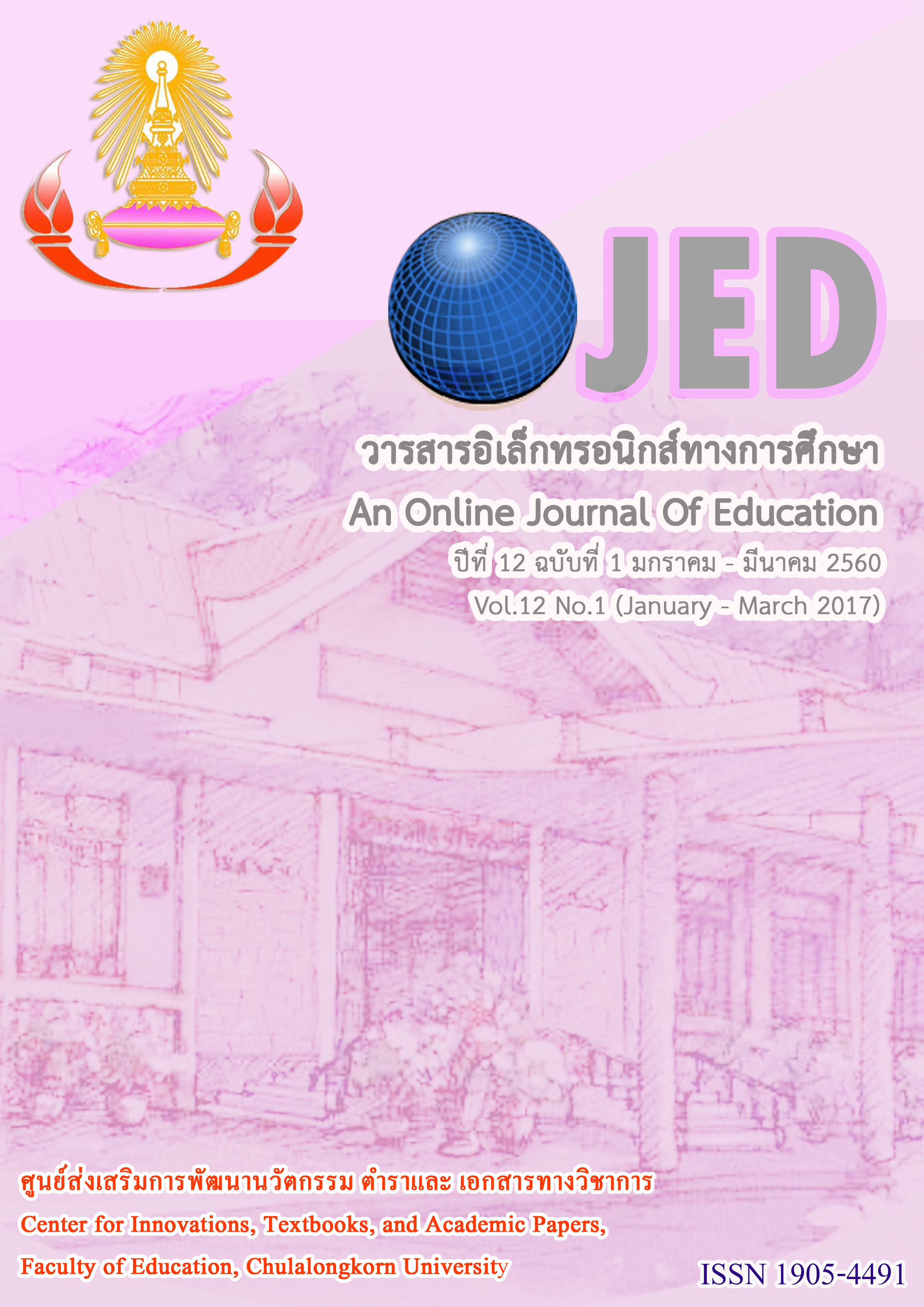ผลของการจัดกิจกรรมการศึกษานอกระบบโรงเรียนตามแนวคิดการศึกษาแบบใช้พื้นที่เป็นฐาน เพื่อเสริมสร้างทักษะทางสังคมสำหรับบุคคลออทิสติกวัยรุ่น
Keywords:
กิจกรรมการศึกษานอกระบบโรงเรียน, การศึกษาแบบใช้พื้นที่เป็นฐาน, ทักษะทางสังคม, บุคคลออทิสติกวัยรุ่น, NON-FORMAL EDUCATION ACTIVITIES, PLACE-BASED EDUCATION, SOCIAL SKILLS, ADOLESCENT WITH AUTISM SPECTRUM DISORDERAbstract
การวิจัยวิจัยครั้งนี้มีวัตถุประสงค์เพื่อ 1) ศึกษาทักษะทางสังคมของบุคคลออทิสติกวัยรุ่น 2) พัฒนากิจกรรมการศึกษานอกระบบโรงเรียนตามแนวคิดการศึกษาแบบใช้พื้นที่เป็นฐานเพื่อเสริมสร้างทักษะทางสังคมสำหรับบุคคลออทิสติกวัยรุ่น 3) เปรียบเทียบทักษะทางสังคมของบุคคลออทิสติกวัยรุ่นก่อนและหลังการเข้าร่วมกิจกรรมการศึกษานอกระบบโรงเรียนตามแนวคิดการศึกษาแบบใช้พื้นที่เป็นฐานเพื่อเสริมสร้างทักษะทางสังคมสำหรับบุคคลออทิสติกวัยรุ่น ตัวอย่างในการวิจัยคือ บุคคลออทิสติกวัยรุ่นที่ศึกษาในศูนย์ส่งเสริมทักษะชีวิตบุคคลออทิสติกจังหวัดปทุมธานี มีอายุระหว่าง 15 – 25 ปี จำนวน 10 คน ซึ่งได้มาจากการคัดเลือกแบบเจาะจง การวิจัยครั้งนี้เป็นการวิจัยเชิงทดลอง มีรูปแบบการทดลองแบบ One-Group Pretest-Posttest Design เครื่องมือที่ใช้ในการวิจัยประกอบด้วย 1) แบบสอบถามทักษะ ทางสังคมที่เป็นปัญหาของบุคคล ออทิสติกวัยรุ่น 2) แบบเสนอชื่อคัดเลือกบุคคลออทิสติกวัยรุ่น 3) แบบสัมภาษณ์พฤติกรรมทักษะทางสังคมเบื้องต้นของบุคคลออทิสติกวัยรุ่น 4) แผนการจัดการศึกษาเฉพาะบุคคล 5) แบบสอบถามพื้นที่ในการจัดกิจกรรมฯ 6) แผนการจัดกิจกรรมฯ และ 7) แบบสังเกตทักษะทางสังคมสำหรับบุคคลออทิสติกวัยรุ่น วิเคราะห์ข้อมูลแบบสอบถามทักษะทางสังคมที่เป็นปัญหาของบุคคลออทิสติกวัยรุ่นโดยหาค่าเฉลี่ยเลขคณิตและค่าส่วนเบี่ยงเบนมาตรฐาน และเปรียบเทียบความแตกต่างค่าเฉลี่ยของคะแนนก่อนและหลังการเข้าร่วมกิจกรรมด้วยสถิติทดสอบ The Wilcoxon Matched Pairs Signed-Ranks Test ผลการวิจัยพบว่า 1. ทักษะทางสังคมของบุคคลออทิสติกวัยรุ่น ประกอบด้วย 1) การควบคุมตนเอง 2) การสื่อสารกับบุคคลอื่น 3) การทำกิจกรรมร่วมกับบุคคลอื่น และ 4) การมีความรับผิดชอบต่อสังคม 2. ผลของกิจกรรมการศึกษานอกระบบโรงเรียน ตามแนวคิดการศึกษาแบบใช้พื้นที่เป็นฐานเพื่อ เสริมสร้างทักษะทางสังคมพบว่า กิจกรรมมีความเหมาะสมและสอดคล้องในการเสริมสร้างทักษะทางสังคมสำหรับบุคคลออทิสติกวัยรุ่น และ 3. ผลการเปรียบเทียบทักษะทางสังคมของบุคคลออทิสติกวัยรุ่นก่อนและหลังการเข้าร่วมกิจกรรมการศึกษานอกระบบโรงเรียนตามแนวคิดการศึกษาแบบใช้พื้นที่เป็นฐานพบว่า บุคคลออทิสติกวัยรุ่นมีทักษะทางสังคมสูงขึ้นอย่างมีนัยสำคัญทางสถิติที่ระดับ .01
The purposes of this research were: 1) to study the social skills in adolescents with autism spectrum disorder, 2) to develop non-formal education activities based on place-based education on social skills in adolescents with autism spectrum disorder, and 3) to compare social skills in adolescents with autism spectrum disorder before and after using the non-formal education activities based on place-based education on social skills in adolescents with autism spectrum disorder.
The sample consisted of 10 students who studied in the Autistic Life Skills Center of Pathumthani province in the age range of 15 to 25 years old. These students were selected by purposive sampling. This research was experimental and applied the One-Group Pretest-Posttest Design as the experimental methodology. The experimental materials used in this research were 1) the questionnaire dyslexic on social skills in adolescents with autism spectrum disorder, 2) the nomination form for adolescents with autism spectrum disorder, 3) the social skills interview form, 4) the Individualized Education Program, 5) the questionnaire area for organizing non-formal education activities based on place-based education on social skills in adolescents with autism spectrum disorder, 6) a course syllabus for the non-formal education activities based on place-based education on social skills in adolescents with autism spectrum disorder, and 7) the social skills record form for adolescents with autism spectrum disorder. Arithmetic mean and stand deviation were used to analyze the data from the questionnaire on dyslexic on social skills in adolescents with autism spectrum disorder. In addition, the Wilcoxon Matched Pairs Signed-Ranks Test was used to compare the social skills in adolescents with autism spectrum disorder before and after using the non-formal education activities based on place-based education on social skills in adolescents with autism spectrum disorder.
The research findings were as follows: 1. Social skills in adolescents with autism spectrum disorder consisted of 1) self-control, 2) communication with others, 3) working with others, and 4) corporate social responsibility. 2. The result of developing non-formal education activities based on place-based education on social skills in adolescents with autism spectrum disorder is appropriate and consistent for improving the social skills of adolescents with autism spectrum disorder. 3. The comparing of social skills in adolescents with autism spectrum disorder before and after using the non-formal education activities based on place-based education on social skills in adolescent with autism spectrum disorder found that after the experiment is higher than before the experiment at a statistically significant level of .01.




